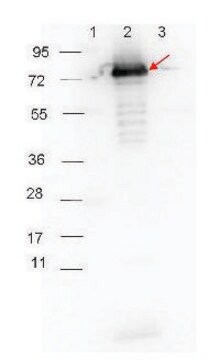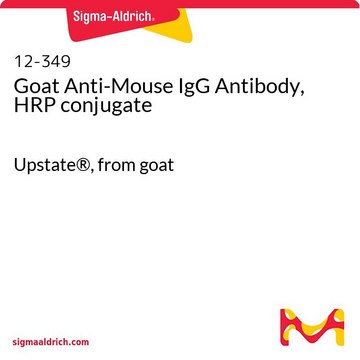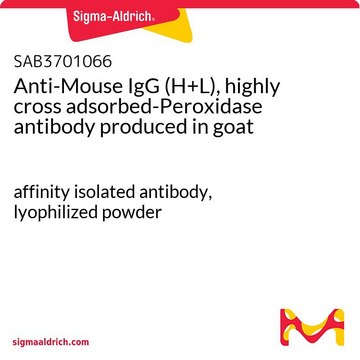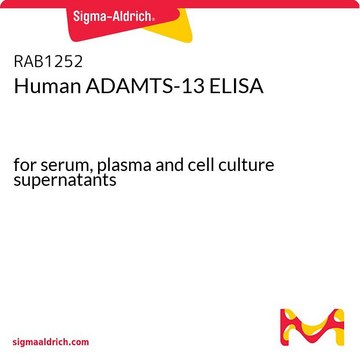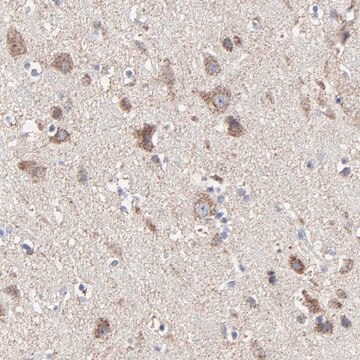SAB3700972
Anti-Rabbit IgG (H+L), F(ab) fragment-Peroxidase antibody produced in goat
affinity isolated antibody, lyophilized powder
Synonym(s):
HRP
Sign Into View Organizational & Contract Pricing
All Photos(1)
About This Item
UNSPSC Code:
12352203
NACRES:
NA.46
Recommended Products
biological source
goat
Quality Level
conjugate
peroxidase conjugate
antibody form
affinity isolated antibody
antibody product type
secondary antibodies
clone
polyclonal
form
lyophilized powder
species reactivity
rabbit
technique(s)
immunohistochemistry: suitable
indirect ELISA: suitable
western blot: suitable
shipped in
wet ice
storage temp.
2-8°C
target post-translational modification
unmodified
Related Categories
Specificity
This product was prepared from monospecific antiserum by immunoaffinity chromatography using Rabbit IgG coupled to agarose beads followed by solid phase adsorption(s) to remove any unwanted reactivities, papain digestion and chromatographic separation. Assay by immunoelectrophoresis resulted in a single precipitin arc against Anti-Peroxidase and Anti-Goat Serum. No reaction was observed against Anti-Papain or Anti-Goat IgG F(c).
Immunogen
Rabbit IgG whole molecule
Physical properties
Antibody format: IgG Fab
Physical form
Supplied in 0.02 M Potassium Phosphate, 0.15 M Sodium Chloride, pH 7.2 with 10 mg/mL Bovine Serum Albumin (BSA) - Immunoglobulin and Protease free
Reconstitution
Reconstitute with 1.0 mL deionized water (or equivalent).
Disclaimer
Unless otherwise stated in our catalog or other company documentation accompanying the product(s), our products are intended for research use only and are not to be used for any other purpose, which includes but is not limited to, unauthorized commercial uses, in vitro diagnostic uses, ex vivo or in vivo therapeutic uses or any type of consumption or application to humans or animals.
Not finding the right product?
Try our Product Selector Tool.
Certificates of Analysis (COA)
Search for Certificates of Analysis (COA) by entering the products Lot/Batch Number. Lot and Batch Numbers can be found on a product’s label following the words ‘Lot’ or ‘Batch’.
Already Own This Product?
Find documentation for the products that you have recently purchased in the Document Library.
Kunal B Shah et al.
PloS one, 9(8), e104127-e104127 (2014-08-08)
In several species including the buffalo cow, prostaglandin (PG) F2α is the key molecule responsible for regression of corpus luteum (CL). Experiments were carried out to characterize gene expression changes in the CL tissue at various time points after administration
Arturo Giordano et al.
Vascular pharmacology, 61(2-3), 63-71 (2014-04-23)
Tirofiban is a fibrinogen receptor antagonist, generated using the tripeptide Arg-Gly-Asp (RGD) as a template. RGD activates integrin receptors and integrin-mediated signals are necessary for normal cells to promote survival and stimulate cell cycle progression. We investigated whether tirofiban activated
Naoki Tanaka et al.
Biochimica et biophysica acta, 1841(11), 1596-1607 (2014-09-03)
Methionine- and choline-deficient diet (MCD) is a model for nonalcoholic steatohepatitis (NASH) in rodents. However, the mechanism of NASH development by dietary methionine/choline deficiency remains undetermined. To elucidate the early metabolic changes associated with MCD-NASH, serum metabolomic analysis was performed
Sheila R Costford et al.
American journal of physiology. Endocrinology and metabolism, 306(12), E1341-E1353 (2014-04-25)
Chronic low-grade inflammation is an important contributor to the development of insulin resistance, a hallmark of type 2 diabetes mellitus (T2DM). Obesity and high-fat feeding lead to infiltration of immune cells into metabolic tissues, promoting inflammation and insulin resistance. We
Yun Wang et al.
Experimental eye research, 125, 128-134 (2014-06-15)
The purpose of this study is to evaluate the neuroprotective effects of C3 exoenzyme (C3) on N-methyl-d-aspartate (NMDA)-induced retinopathy in rats. C3 was expressed in Escherichia. coli and purified by affinity chromatography. Immunofluorescence was performed in NIH 3T3 cells treated
Our team of scientists has experience in all areas of research including Life Science, Material Science, Chemical Synthesis, Chromatography, Analytical and many others.
Contact Technical Service